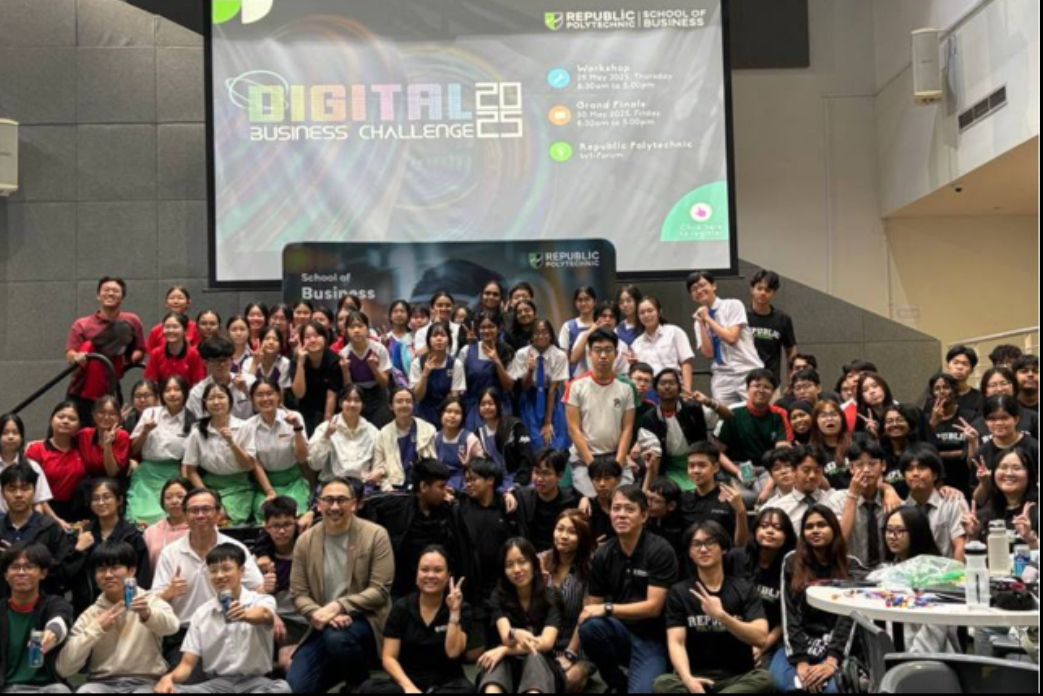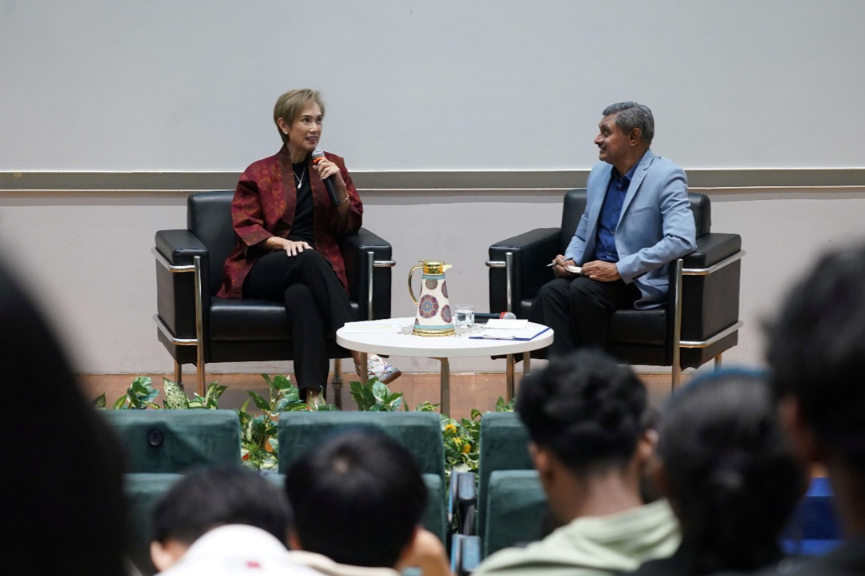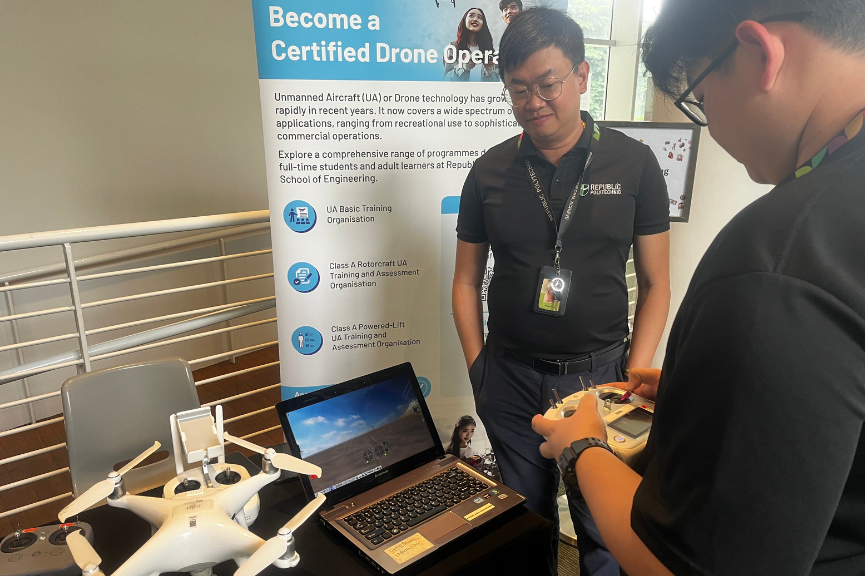It was a momentous occasion for Republic Polytechnic (RP) as the annual Senior Management Dialogue was held on campus on Nov 25 after two years of pandemic restrictions.
Hosted in the TRCC Studio, the dialogue saw over 200 attendees, including student leaders from the sixth OneRP committee across the 12 clubs and seven schools, RP staff and heads of departments (HODs).
The annual dialogue allows student leaders to give feedback on RP-related matters, seek answers to their questions and suggest solutions to the senior management.
The session kicked off with a sharing from the 20th student council president, Lau Min Hann, on the highlights and achievements of the OneRP committee. A video featuring past committee events and initiatives, such as the SAS sports day, Project Care Kids, and the RP20 tree planting ceremony was shared.
Following this was the Q&A segment, the panel line-up consisting of Principal Mr Yeo Li Pheow, Deputy Principal for Academic Services Dr Michael Koh, Deputy Principal for Skills Future and Organisational Development Mr Boo Chong Han, Senior Director for Student Services and Director for Office of Student Support Mr Ashley Chua, and Director for Office of Student and Graduate Affairs Mr Ganesh Kalyanam.
There was a hive of enthusiasm in the hall as students represented their student bodies and contributed to a fruitful discussion.
Here are six topics discussed during the segment.
PERENNIAL ISSUE OF RJ WORKLOAD AND DEADLINES
The segment opened with concerns about the Reflection Journal (RJ) workload.
Michelle Lin, a second-year Digital Design and Development student from the SOI club, shared that students are overwhelmed by the daily RJ workload and requested a break from it during the Mid-Semester Assessment (MSA) period.
Dr Koh explained that 70 percent of lessons fall under large lesson packages spanning two to three weeks, and students currently do not have weekly RJs for such lessons. Through this, he hopes students will have more time to internalise knowledge.
On the role of RJs, Mr Yeo shared that, in comparison to a lecture system, daily reflections will allow students to pick up knowledge faster.
Citing a study that showed better memory retention within the first eight hours, he added: “It is important that you do your RJ before midnight because within that day you recall your learning points.”
On a similar note, Felicia Aw, a Pharmaceutical Science student and student council member, shared that meeting tight deadlines can be challenging for those who have other commitments or long commutes. Even with 8 a.m. extensions, students would have to sacrifice sleep, social life, and study time to complete deliverables.
She proposed a two to three-day extension for deliverables for a more balanced workload.
Regarding her concerns, Dr Koh acknowledged that each student has different time management skills and commitments and noted that more consideration will be given to the issue.
He added that it will be reviewed case-by-case per school, and it is the school’s decision to experiment with it, reiterating better knowledge retention through meeting 2359 deadlines.
He also explained that extensions might cause a snowball effect, as students will have more work to do the next day. Discipline is hence necessary to prevent this.
Mr Yeo reminded students that their workload would increase as they progress from university to the real world. He believes RP’s system will help prepare students in the long run.
“While you may experience some unpleasantness, you will always tell yourself in order to grow, you need to stretch. If you don’t stretch and undergo a reasonable degree of discomfort, it is very hard to grow,” Mr Yeo advised.
ADDRESSING BUDGET CUTS FOR INTEREST GROUPS
Asadullah Khurshid, a second-year student in Human Resource Management with Psychology, SMC Club, and Republic Sports Club cited the need for funding for equipment and competitions to highlight the recent budget cuts for various interest groups (IGs) and asked how student leaders will be supported through the new changes.
Mr. Ganesh responded that management has been very supportive of student initiatives and development but also had to be very prudent in managing budgets and allocating funds for various IGs. RP will also continue to work with different partners to effectively increase resources to support the many projects that students have planned.
Mr Yeo affirmed that the management is very supportive of funding student activities and is prioritising more meaningful activities for effective fund allocation.
Mr Yeo emphasised the importance of student safety and guarantees to replace defective or dated equipment, and will prioritise funds to address this.
SCOPE OF FINANCIAL SUPPORT SCHEMES
Nazri Nazir, a second-year Customer Experience Management with Business student and SOH Club member, raised concerns over the lack of financial support schemes for ineligible students who require financial aid, such as those working in part-time jobs, who are often forced to neglect school, hence underperforming or dropping out.
Mr Chua responded that RP’s financial support schemes cover a wide range of students.
The current financial support schemes available include the Mendaki Tuition Fee Subsidy, Post Secondary Education Scheme, CPF Education Loan Scheme and the Tuition Fee Loan.
He suggested that the school may be unaware of these needy student groups or that the students have not reached out for help.
He also explained that ineligible students can still approach the school if they require support. Financial support will be considered on a case-by-case basis, such as for the passing of a family member.
Ultimately, he urges students in need of financial assistance to approach their mentors for help and encouraged student leaders to be there for these students.
IS SCHOOL WIFI BAD?
A student from the School of Technology for the Arts raised concerns over the school WiFi system being unreliable and inconsistent.
He pointed out some of the common issues which have disrupted students’ productivity, such as the Guest@RP WiFi hindering access to the LEO 2.0 system, accessible websites differing between mobile phones and laptops, and WiFi being inaccessible in certain locations like the food courts.
Mr Neo, RP’s Chief Information Officer (CIO) stepped in to address the issues, stating that the team is aware and have rolled out initiatives to resolve such issues.
He said that a house IT Pulse survey was sent to students’ emails, assessing their understanding of the school WiFi system or laptop-related issues. Mr Neo also noted that the survey has been extended to 10 Dec and urged students to participate.
He added that RP is working closely with different mobile brands to manage internet security. According to data, Mr Neo shared that due to many students watching Netflix in school, this may have affected the network performance.
To curb the issue, he suggested that students avoid watching Netflix in school to ensure their learning experience is not negatively affected due to WiFi issues.
CLASSES IN LECTURE THEATRES?
Nur Qahirah, a Health Services Management student, requested for learning opportunities beyond the classroom, such as lecture hall sessions, field trips, and lessons in RP’s learning facilities to increase the dynamism and conduciveness of lessons.
To answer her concerns, Mr Boo stated that there is a lot of effort put into crafting authentic and challenging problem statements, allowing students to have a hands-on learning environment.
He added that companies do not always have the flexibility to host students and explained that the school is a safe-to-fail environment where students can grow despite failures.
Mr Yeo added that holding classes in lecture halls wastes resources since the small class sizes are not suitable for large halls. However, RP has many authentic learning environments that may come in later semesters. He also explained that during the peak of the pandemic, there were concerns students may run into risks, such as contracting viruses when attending field trips in high-risk environments such as hospitals.
Nevertheless, he added that the school is slowly opening up and exploring ways to foster students’ interests.
DEALING WITH NEGATIVE BRANDING
When questioned about RP’s negative image, Mr Yeo noted that the school’s branding has been a persistent concern. He emphasised that RP’s branding depends on both its management and the students, emphasising the importance of behaviour while on internships.
He also reported that many RP students have been highly praised for their internship work.
“Employer perceptions have been very positive and many of our students end up with jobs even as they graduate,” he added.
However, instances of truancy and misbehaviour during internships, along with public misbehaviour, have also damaged RP’s reputation. This may lead to social media users venting about RP and its students.
Mr Yeo added that corporate communications closely monitors social media, but also requested students to stand together to help defend and refute any false claims made about RP.
Mr Ganesh also encouraged students to share RP’s triumphs and successes on social media to help “spread all the good work that we do”.
The Q&A segment closed with Mr Yeo thanking the student leaders and affirming their importance to RP. The dialogue then concluded with a photo-taking session.






